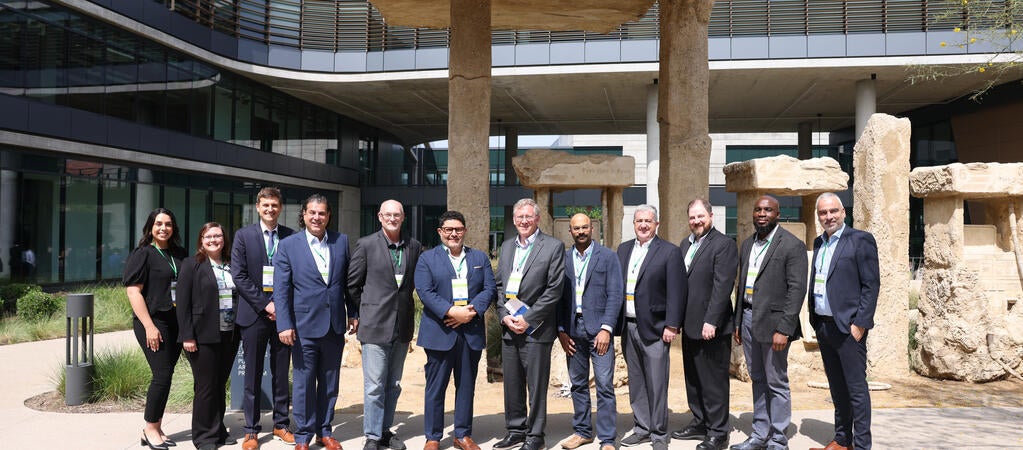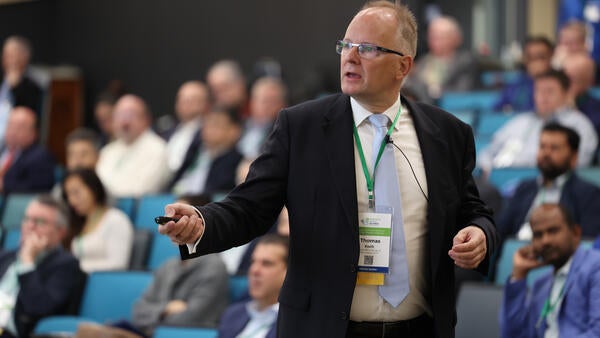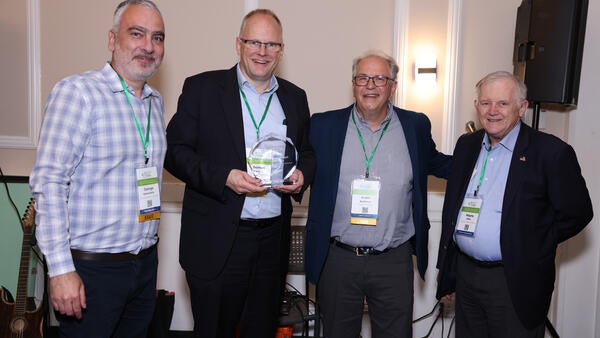
North America Unites Around Hydrogen Combustion at First H2EA Conference
As decarbonization pressures rise, hydrogen combustion is stepping into the spotlight, with technical momentum and industry support behind it.
May 14, 2025
May 1, 2025 | Riverside, Calif. - On May 1-2, the Hydrogen Engine Alliance - North America (H2EA-NA) hosted the Inaugural 2025 North American Hydrogen Engine Conference at the California Air Resources Board (CARB) headquarters in Riverside. The conference gathered over 150 attendees from more than 90 organizations across industry, academia, and government. With packed sessions, high-level technical presentations, and dynamic networking, the event affirmed hydrogen-powered internal combustion engines (H2-ICE) as a rising force in the clean transportation landscape.

This year’s theme, Driving Hydrogen Forward: Technology, Applications, and Industry Insights, highlighted the Alliance’s mission to accelerate hydrogen engine deployment in hard-to-electrify sectors such as heavy-duty transportation, off-road equipment, and industrial logistics.
A Program Built on Expertise and Real-World Application
The conference featured four focused sessions: Progress in H2-ICE, Hydrogen Production, Logistics, Infrastructure & Safety, On-Road & Off-Road Applications, and H2-ICE Challenges and Opportunities.
Keynote speaker Professor Thomas Koch of Karlsruhe Institute of Technology and CEO of Allianz Wasserstoffmotor (Europe’s Hydrogen Engine Alliance) kicked off the day with a global perspective on the role of hydrogen engines in Europe’s transition to carbon-neutral mobility. He emphasized the need for collaboration across sectors, sharing key insights from Germany’s evolving hydrogen roadmap, infrastructure challenges, and the technical maturity of H2-ICE platforms in heavy-duty transport.
The sessions that followed were equally compelling. From the Bosch system-level engineering for hydrogen engines (Brent Keppy) to Cummins' practical path to market deployment (Imon Uduehi), and Forvia’s scalable infrastructure plans (Tarek-Abdel Baset), the presentations struck a balance between technical rigor and commercial strategy.
Presentations from AVL, Baker Hughes, Chevron, Daimler Truck North America, Eaton, FEV, GTI Energy, Mahle, Phinia, Sandia National Laboratories, Southwest Research Institute, Tenneco, and Volvo showcased innovations in hydrogen injection systems, fuel storage, pre-ignition control, and real-world vehicle applications, including emissions results and system durability.
“We started the Hydrogen Engine Alliance to create a focused platform for collaboration around hydrogen combustion, and this conference was an important first step,” said Georgios Karavalakis, Co-Director of H2EA-NA and professor at UC Riverside. “It was dynamic, fast-paced, and full of meaningful exchange- there’s clearly a strong need for this kind of forum.”

The conference was made possible by the support of H2EA-NA’s founding members, Bosch, Chevron, Cummins, Daimler Truck North America, Forvia, Mahle, and Tenneco, who have been engaged since the Alliance’s formation.
Event sponsors included Silver Sponsors: South Coast Air Quality Management District (AQMD) and Infineum, and Bronze Sponsors: Agilent Technologies, Convergent Science, Engine Technology Forum, Sacramento Metropolitan AQMD, San Joaquin Valley Air Pollution Control District, and Southwest Research Institute.
Building Community and Momentum
Beyond the main sessions, attendees participated in a networking banquet and an exclusive tour of CARB’s state-of-the-art emissions testing and research facilities. These touchpoints generated high engagement and left attendees energized for what’s next.
Comments throughout the day reflected the energy in the room: diverse, solutions-oriented, and forward-looking. Many noted the unique blend of technical depth and strategic relevance, describing the event as one of the few truly focused forums on hydrogen combustion today.
“The Hydrogen Engine Alliance is united in the belief that developing hydrogen engine technology is essential to building climate-neutral, sustainable, and competitive mobility systems,” said Christopher Lynch, Dean of the Marlan and Rosemary Bourns College of Engineering at UC Riverside, during his banquet remarks.
An Alliance Positioned to Lead with Practical Innovation

The inaugural conference marked a significant milestone for H2EA-NA, a binational effort co-led by the University of California, Riverside, and the University of Michigan. Modeled after Europe’s Allianz Wasserstoffmotor, the Alliance was established to accelerate the development and deployment of H2-ICE as a near-term, scalable solution for low-carbon transportation.
Today, hydrogen combustion is far from conceptual. With compatible engine platforms, shared components with existing diesel systems, and increasing alignment across regulatory frameworks, H2-ICE technology is gaining real traction as a practical pathway toward decarbonization.
“The level of engagement from attendees, speakers, and sponsors showed that the hydrogen combustion community is ready to move forward together,” said André Boehman, Co-Director of H2EA-NA and professor at the University of Michigan. “The momentum coming out of Riverside made it clear this was a timely and much-needed event.”
Looking Ahead
Save the date for the Fall 2025 North American Hydrogen Engine Conference, to be held October 13–14, 2025, in Ann Arbor, Michigan, hosted by the University of Michigan. More information will be available soon at h2engine-alliance.org.
For more information about the Hydrogen Engine Alliance - North America, upcoming events, or membership opportunities, please visit h2engine-alliance.org or contact info@h2engine-alliance.org.
